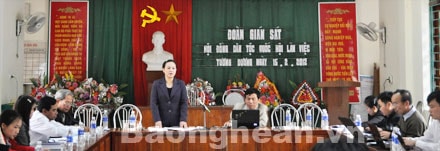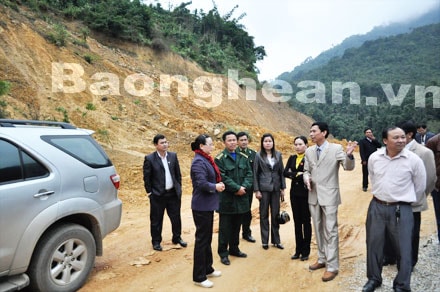Monitoring the Program to support rapid and sustainable poverty reduction in Tuong Duong district
(Baonghean.vn) – After the working program in Que Phong district, today (February 15), the 13th National Assembly Ethnic Council delegation led by Ms. Trieu Thi Nai - Vice Chairwoman of the Ethnic Council had a working session with Tuong Duong district. Also attending the working session were representatives of the Provincial National Assembly Delegation, the Ethnic Committee, and the Provincial Department of Labor, Invalids and Social Affairs.
(Baonghean.vn) – After the working program in Que Phong district, today (February 15), the 13th National Assembly Ethnic Council delegation led by Ms. Trieu Thi Nai - Vice Chairwoman of the Ethnic Council had a working session with Tuong Duong district. Also attending the working session were representatives of the Provincial National Assembly Delegation, the Ethnic Committee, and the Provincial Department of Labor, Invalids and Social Affairs.
Comrade Trieu Thi Nai spoke at the meeting.
Before the working session, the Delegation visited the wild boar farming model of Mr. Tong Van Chien and Ho Viet Minh's family in Bai So village, Tam Quang commune. So far, the pigs have spawned for the first time and are growing well. Next, the Delegation visited Mr. Ho Viet Thanh's family, one of the households in Tam Quang commune that received support to remove makeshift thatched houses under Program 167 and Tam Dinh Commune Health Station - a project invested and built with support capital from the Joint Stock Commercial Bank for Foreign Trade of Vietnam Vietcombank. In addition, the Delegation also visited the border belt road leading to Tung Huong and Lien Huong villages in Tam Dinh commune, one of the traffic works built with capital from Program 30a.

Supervision at the border belt road through Tam Quang commune
Working with the leaders of Tuong Duong district, the delegation listened to a report on the implementation of Program 30a in the area. After 3 years of implementing the Resolution, integrating programs and projects of the Government, people's lives have changed, especially poor households.
In 3 years, 2,112 houses have been built according to Decision 167 on Housing Support Policy for Poor Households, reaching 100% of the plan. The district has provided over 29 billion VND in funding to implement the following items: land reclamation, restoration, support for cattle, barns, etc. Many household economic development models have been implemented such as black pig, wild boar, porcupine farming, grass growing model in Tam Quang, Thach Giam, Yen Na communes, which have initially shown effectiveness. With a state budget of 77 billion VND, and support capital of 47 billion VND from Vietnam National Shipping Lines, Vietnam Joint Stock Commercial Bank for Foreign Trade (Vietcombank), Vietnam Oil and Gas Group, the district has implemented the construction of key projects such as transportation, electricity, schools, clinics, etc., creating favorable conditions for socio-economic development in the area. Up to now, the district has deployed 49 young intellectuals to help poor communes according to the policy of rotating cadres, attracting young intellectuals and technical experts to work in poor communes effectively... From the implementation results, the poverty rate in 2009 of Tuong Duong was 57.4%, by early 2011 it decreased to 48% (according to the old standard), in 2012 it was 65.2% (according to the new standard).
Speaking at the meeting, Comrade Trieu Thi Nai - Vice Chairman of the Ethnic Council acknowledged and highly appreciated the results of the implementation of Resolution 30a of Tuong Duong district. She hoped that in the coming time, the district would continue to promote its effectiveness by helping people access more scientific and technological advances, organizing training sessions, and supporting the development of sustainable agricultural and forestry production in the direction of commodity production; exploiting the strengths of the locality in economic development, such as livestock breeding and afforestation, contributing to the construction of a stable and developed new countryside. The recommendations of the district and the Delegation will be compiled and commented on in the upcoming National Assembly session.
Quang An






